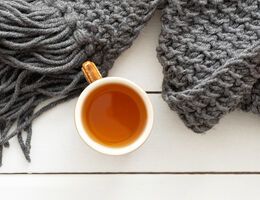Health library
Back to health libraryTea talk: 5 reasons to enjoy this fall favorite

Oct. 28, 2024—Crisp, fall weather calls for a cup of hot tea. And the drink is more than just cozy. Tea also serves up antioxidant compounds that are good for your health, notes the Academy of Nutrition and Dietetics.
So pull out the kettle and your favorite mug. Here are just a few of the science-backed reasons to sip the stuff all season long.
Healthy aging. Research suggests that regular tea drinkers in the United Kingdom live longer, reports AARP. They may also have better cognitive functioning as they age. The antioxidant compounds in tea may help keep the body's cells healthy and fight inflammation.
Weight loss. Tea is tasty and calorie-free (as long as you don't add milk or sweetener). If you're trying to lose weight, replacing sugary sodas or juices with tea can help, per the Academy. But, according to the National Center for Complementary and Integrative Health, research doesn't support the idea that green tea helps people who are overweight or obese lose weight or keep it off.
Heart health. Tea may support healthier cholesterol levels and lower blood pressure, says the American Heart Association (AHA). And that could help lower your risk for heart disease, heart attack or stroke.
Relaxation. Taking time out from your busy day to brew and sip a cup of tea can help you unwind. Tea also contains amino acids thought to aid in relaxation, according to AARP.
Sounder sleep. Try a cup of herbal tea, like chamomile or lemon balm, before bed, says the Sleep Foundation. These options, which are caffeine-free, contain compounds that may improve sleep quality. Avoid caffeinated teas, like black, green or oolong tea, before bed. They have less caffeine than coffee—but they could still disrupt your sleep.
And, of course, you can't mention fall and tea without talking about cold and flu season. The drink is a soothing way to stay hydrated when you're under the weather. Find more cold remedies that work right here.
Before you pour
According to the AHA, tea is a healthy choice for most adults—in moderation. But there are a few things to keep in mind:
- Drinking too much tea can mean consuming too much caffeine. That can lead to problems such as anxiety or trouble sleeping.
- Some teas can interact with certain medications, reports the Academy and the NCCIH. It's a good idea to check in regularly with your doctor to go over any medications and supplements you take and ask if there are any foods, drinks or medicines to avoid.
- Your cuppa is only as healthy as what you put in it (or leave out). You'll reap the biggest benefits from tea when you drink it without milk, cream or sugar. Add flavor with mint leaves or cinnamon instead.
- Bottled or powdered brews may not offer the same benefits, warns the Academy. Processing tea destroys some of the antioxidants. The same goes for iced tea, which tends to be watered down and left in the fridge, notes AARP.
Sources
- Academy of Nutrition and Dietetics. "The Health Benefits of Tea." https://www.eatright.org/health/wellness/healthful-habits/the-health-benefits-of-tea.
- AARP. "8 Surprising Health Benefits of Tea." https://www.aarp.org/health/healthy-living/info-2022/benefits-of-tea.html.
- American Heart Association. "Teatime Can Be Good For Your Health." https://www.heart.org/en/news/2020/12/14/teatime-can-be-good-for-your-health. Sleep Foundation. "The Best 7 Teas for Sleep." https://www.sleepfoundation.org/sleep-aids/best-tea-for-sleep.